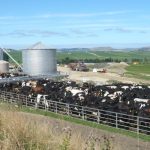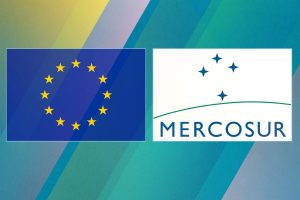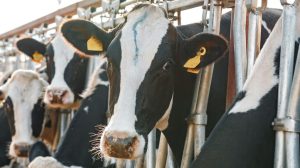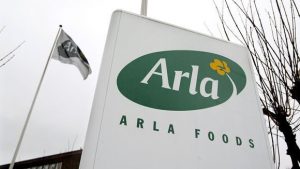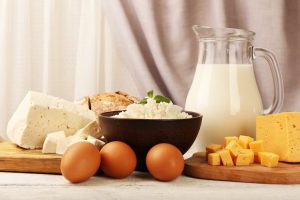
The world’s largest dairy producers and coffee chains are “turning a blind eye” to their methane emissions, despite being responsible for a large portion of one of the world’s “most potent and solvable drivers of global warming,” according to a recent investigation by industry watchdog Changing Markets Foundation (CMF).
The report audited 20 global corporations, including dairy giants like Arla Foods, FrieslandCampina, and DMK Group, and coffee chains like Starbucks, Dunkin’ Donuts, and Costa Coffee. The combined annual revenues of all audited companies are over US$420 billion — more than the GDP of Denmark.
Methane is understood to be 80 times more potent than carbon dioxide, accounting for around 50% of the total GHG emissions of the ten largest dairy companies analyzed. For some companies, like Saputo and Dairy Farmers of America, methane made up an even higher share (59%).
A 2022 report by CMF and the Institute of Agriculture and Trade Policy showed that ten dairy and five meat companies produce more methane emissions than the entire EU. Some individual companies, such as Arla, have been shown in previous analysis by CMF to produce more methane emissions than entire countries, like the Netherlands.
Nusa Urbancic, CEO of CMF, tells Food Ingredients First: “The dairy sector is still shying away from setting methane targets or providing substantial information on how it is achieving or planning to achieve methane reductions. Even for companies claiming to have achieved methane cuts, we lack information and independent verification around where these cuts come from.”
“Another thing that is missing from the basket of solutions being proposed is a shift toward plant-based products, which is something that coffee house companies, especially, should be considering as a key strategy to cut emissions.”
Audit findings
Companies were assessed based on publicly available information and responses to a questionnaire. Six of the 20 companies analyzed responded to the questionnaire “either fully or to a meaningful extent”: Arla, Bel Group, Danone, DMK, FrieslandCampina, and Saputo. Nestlé shared some information via email, but did not complete the questionnaire.
The companies were then ranked according to their awareness of impact and resulting product changes, emissions accounting, emissions reporting, and action plans.
Danone scored the highest overall, followed by General Mills. Nestlé and Arla tied for third. The Bel Group followed in fifth position. The vast majority of companies — 18 out of 20 — scored less than half of the available points in the total ranking.
All coffee house companies ranked among the bottom nine, with Dunkin’ at the very bottom, scoring zero points due to the complete absence of methane targets, action plans, and relevant emissions disclosures.
Only six out of 20 companies gave separate accounts for methane emissions, rather than expressing them solely in CO2-equivalent figures. Of those, only one company, Bel Group, reported methane in a fully disaggregated way.
 The ten biggest dairy companies on earth emit more methane than all EU nations combined.Where ambition fell shortest was in setting methane reduction targets and action plans. Only one company — Danone — had both a methane-specific target and an aligned, detailed plan.
The ten biggest dairy companies on earth emit more methane than all EU nations combined.Where ambition fell shortest was in setting methane reduction targets and action plans. Only one company — Danone — had both a methane-specific target and an aligned, detailed plan.
Only two companies, Nestlé and Danone, reported methane reductions (13.3% for Danone and 20.56% for Nestlé), but according to CMF, they did not provide “sufficient detail” on where these reductions come from.
“The near-total absence of methane-specific targets and credible action plans sends a clear signal: companies are not yet fully committed to tackling one of the most potent and solvable drivers of global warming,” reads the report.
Industry action
Despite the findings, many of the companies audited claim to be taking serious action on their methane emissions.
For example, Nestlé claims a 20.56% reduction from its 2018 baseline, and Danone announced yesterday that it has reduced its emissions by 25.3% since 2020. In a statement, Danone says: “This is a multi-year journey with more work ahead and collective initiatives like the Dairy Methane Action Alliance are going in the right direction to achieve methane reduction in the sector at scale.”
Urbancic again says details are lacking to substantiate these claims.
“If such methane cuts are happening, this is great news, but it would be essential for these companies to provide more details on the most successful strategies, which could then build confidence in the sector around setting targets,” she says.
Arla, which was the target of a separate CMF report earlier this year, has said the investigations made into its emissions contain “multiple inaccuracies.” Arla runs on a co-operative structure, which relies on a decentralized community of over 8,000 farmers, who are given incentives to improve their practices.
An Arla spokesperson told us at the time that the company is thoroughly reviewing the reports but had not found the conclusions to be a genuine reflection of its science-based targets or commitments.
Bad for business
The findings should spur government action, says Urbancic, especially as the results show that the industry can make significant improvements when compelled to.
“An interesting message to policymakers coming out of our report is that the companies that are taking methane seriously can deliver reductions, but overall, the industry is still dragging its feet. Legislation could definitely accelerate the efforts around transparency and accountability on methane emissions and level the playing field,” she says.
“Ahead of COP30 in Brazil, for many countries, it will not be possible to reach 30% reductions without addressing livestock methane emissions. Regulating Big Dairy and Meat companies could be a no-brainer, as these companies really have the potential to invest in solutions and scale up their efforts to reduce methane.”
Urbancic says that despite political intervention, the industry should be aware that methane emissions are damaging its own profits.
“Extreme heat and drought are stressing dairy cows, leading to decreased milk production and threatening to diminish the profits of global dairy giants. Given that cutting methane is a climate emergency break, food companies should also see this as a matter of economic self-interest, ensuring long-term sustainability and profitability.”
“Especially coffee companies can and should do more to promote plant-based milks, starting by making them cheaper than dairy. We hope our report will help them wake up and smell their own coffee.”
You can now read the most important #news on #eDairyNews #Whatsapp channels!!!
🇺🇸 eDairy News INGLÊS: https://whatsapp.com/channel/0029VaKsjzGDTkJyIN6hcP1K


